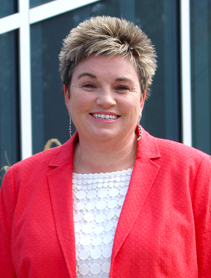
Dr. Karen Molek
- Position: Associate Vice President of Computational Intelligence and Student Scholars Programs, Chemistry Professor
- Department: Chemistry
- Office Location: Building 58, Room 204B
- ksmolek@uwf.edu
- Campus: 850.474.2799
Biography
Dr. Karen Sinclair Molek, Professor of Chemistry and Associate Vice President of Computational Intelligence and Student Scholars Programs, has received mentoring awards and more than $5 million in outside funding.
- 2024 Inspiring Program in STEM Award from INSIGHT into Diversity Magazine for UWF STEM Scholars
- 2021 Inspiring Program in STEM Award from INSIGHT into Diversity Magazine for Chemistry Scholars
- National American Chemical Society Zaida C. Morales-Martinez Prize for Mentoring ACS Scholars
- UWF Excellence in Teaching and Advising Award
- UWF Undergraduate Research Mentoring Award
- UWF Distinguished Faculty Scholarly and Creative Activities Award
- UWF President's Award for Leadership in Diversity
Molek, who began teaching at UWF in 2008, has helped raise more than $5 million in outside funding. This includes more than $4 million in grant awards from the National Institutes for Health to increase the number of students from disadvantaged backgrounds pursuing biomedical-relevant research careers through PhD or MD/PhD degrees. The funding established and continues to support the NIH-funded UWF MARC Scholars Program and UWF U-RISE Scholars Programs. The National Science Foundation awarded $649,888 to increase retention, academic performance, degree attainment, employment, and graduate school matriculation rates among financially disadvantaged, academically talented students in STEM majors. This funding established the NSF S-STEM Scholars Program (2016-2021) and the STEM Living Learning Community (2016 - present).
Molek's goal is to empower students to achieve successful STEM careers beyond UWF. She said research shows that economically disadvantaged students are less likely to pursue Science, Technology, Engineering, and Math careers. She empowers students through teaching and providing support through Scholars Programs and undergraduate research. Molek is the director of UWF’s Chemistry Scholars Program, which was established in 2011 as the first Scholars Program at UWF. Chemistry Scholars won the 2021 Inspiring Program in STEM Award from INSIGHT into Diversity Magazine. The success of Chem, MARC, and S-STEM Scholars led UWF to support Molek and a faculty/staff team to establish UWF STEM Scholars in 2021. STEM Scholars is designed to support students persisting and successfully completing STEM degrees in 4-years.
Molek has a Ph.D. in Physical Chemistry from the University of Georgia and a B.S. in Chemistry from Mercer University. Her research covers several areas: development of a safety relay for high vacuum systems; rebuilding reflectron time-of-flight mass spectrometers surface-assisted laser desorption/ionization of materials using RTOF-MS; synthesis and characterization of transition metal oxide nanopowders; synthesis and characterization of zinc oxide quantum dots; and development of a physical chemistry laboratory experiment measuring the speed of sound using nitrocellulose.
She has personally mentored 71 undergraduate research students, 166 Chemistry Scholars, 34 NIH MARC Scholars, and 25 NSF S-STEM Scholars, with more than 70% from financially disadvantaged backgrounds. She and the STEM Scholars faculty/staff team have mentored more than 250 STEM Scholars and more than 650 STEM Living Learning Community residents.
Degrees & Institutions
Ph.D. Physical Chemistry, University of Georgia
B.S. Chemistry, Mercer University
Research
Her research covers several areas: development of a safety relay for high vacuum systems; rebuilding reflectron time-of-flight mass spectrometers surface-assisted laser desorption/ionization of materials using RTOF-MS; synthesis and characterization of transition metal oxide nanopowders; synthesis and characterization of zinc oxide quantum dots; and development of a physical chemistry laboratory experiment measuring the speed of sound using nitrocellulose.
Classes Taught
- General Chemistry
- Basic Physical Chemistry
- Inorganic Chemistry
- Honors Thesis
- Applications of Lasers
- Undergraduate Chem Research
- Seminar in Chemistry
Publications
Olaitan, A. D.; Reyes, K. A.; Barnes, L. F.; Yount, J. R.; Ward, S.; Hamilton, H. S. C.; King, K. E.; Leeuwen, C. J. V.; Stepherson, J. R.; Vargas, T. K.; Kirkconnell, M. P.; Molek, K. S. Transition Metal Oxide Nanoparticles as Surfaces for Surface-Assisted Laser Desorption/Ionization Mass Spectrometry of Asphaltenes. Petroleum Science and Technology 2017, 35 (19), 1917–1924.
Saint-Louis, C. J.; Magill, L. L.; Wilson, J. A.; Schroeder, A. R.; Harrell, S. E.; Jackson, N. S.; Trindell, J. A.; Kim, S.; Fisch, A. R.; Munro, L.; Catalano, V. J.; Webster, C. E.; Vaughan, P. P.; Molek, K. S.; Schrock, A. K.; Huggins, M. T. The Synthesis and Characterization of Highly Fluorescent Polycyclic Azaborine Chromophores. The Journal of Organic Chemistry 2016, 81 (22), 10955–10963.
Molek, K. S.; Reyes, K. A.; Burnette, B. A.; Stepherson, J. R. Measuring the Speed of Sound through Gases Using Nitrocellulose. Journal of Chemical Education 2015, 92 (4), 762–766.
Keywords: high vacuum system safety relay, reflectron time-of-flight mass spectrometers, SALDI of materials using RTOF-MS, transition metal oxide nanopowders, zinc oxide quantum dots, measuring the speed of sound using nitrocellulose, STEM attracting academically talented, financially disadvantaged students, mentoring


